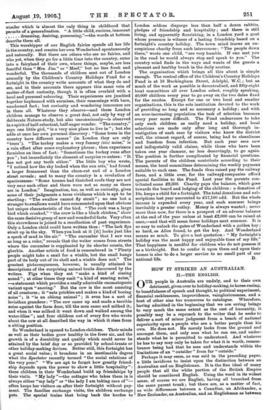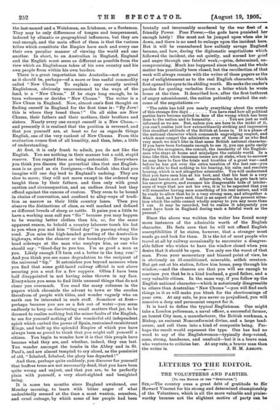HOW IT STRIKES AN AUSTRALIAN. II.—THE ENGLISH.
Perhaps it may seem, as was said in the preceding paper, a little invidious to insist upon the distinction between an Australian and an Englishman. It is the fine ideal of many people that all the white portion of the British Empire should be considered English. Using the word in its widest sense, of course we are English, having all branched from the same parent trunk ; but there are, as a matter of fact, as wide differences between a Canadian, an Afrikander, a New Zealander, an Australian, and an Englishman as between They may be only differences of tongue and temperament, induced by climatic or geographical influences, but they are real enough, and the main effect of them is that the various tribes which constitute the Empire have each and every one their own peculiar manner of viewing the world and one another. In short, to an Australian in England, England and the English must seem as different as possible from the view which an Englishman takes of his own country and his own people from within his own borders.
There is a great importation into Australia—not so great as it should be, perhaps—of a more or less useful commodity called "New Chum." To explain : any recently arrived Englishman, obviously unaccustomed to the ways of the land, is a "New Chum." If he stays long enough, he in turn welcomes or derides "New Chums." The writer is a New Chum in England. Now, almost one's first thought on finding oneself in England for the first time is : "By Jove!
this is where they breed them ! " On all sides are New
Chums, their fathers and their mothers, their brothers and sisters. Nearly every one except oneself is a New Chum,—
and presently it is realised that the position is reversed, and that you yourself are, at least so far as regards things English, one of the very rankest of New Chums. From this realisation comes first of all humility, and then, later, a little of understanding.
At first, it is only frank to admit, you do not like the English. You see nothing in their manner but a cold, stupid reserve. You regard them as being automatic. Everywhere you think you discern the proverbial idea that one English- man is as good as six foreigners,—the foolish idea that you imagine will one day lead to England's undoing. They are slow to move; they will not move except in the ordered way taught them by their fathers, and then only with great caution and circumspection, and an endless dread lest they offend against the canons of custom. They seem to be bound in chains of convention, and confined to alley-ways of tradi- tion as narrow as their little country lanes. Then you observe the distinctions of class, as well marked and defined as different breeds of sheep or cattle. It pains you a little to have a working man call you " Sir " because you may happen to be wearing better clothes than his, or, for the same apparent reason, to behold a country labourer touch his hat to you when you nod him "Good day" in passing along the road. You miss the high-headed greeting of the Australian highways, when the shearer or the boundary-rider wags his head sideways at the man who employs him, as one who should say : "Good-day to you too. I'm as good a man as you. Likely enough Ill turn out a better in the long run!"
And you think you see some degradation to the recipient of the universal "tip." It astonishes you beyond measure when you find that some gold-laced railway official is not above securing you a seat for a few coppers. Often I have been half disappointed in not having coins thrown in ray face. Everywhere you seem to find little unusual things that do not cheer you overmuch. You read the many columns in the papers which chronicle the advent to town or the exodus therefrom of people with titles, and wonder vaguely who on
earth can be interested in such stuff. Somehow at first—
perhaps because you are as a fish out of water—you seem endlessly to keep on discovering small matters that jar, to be doomed to realise nothing but the minor faults of the English, to see for yourself nothing of the wonderful old independent spirit which curbed the power of Spain, restrained recalcitrant Kings, and built up the splendid Empire of which you have always been so proud to think that you might call yourself a citizen. You begin to wonder how it is that this people have become what they are, and whether, indeed, they can last. You wander amongst the tombs in the Abbey and in St. Paul's, and are almost tempted to cry aloud, as the pessimist of old, " Ichabod, Ichabod, the glory has departed !"
And then, perhaps quite suddenly, you discover for yourself that leafless trees are not necessarily dead, that you have been quite wrong and unjust, and that you are, to be perfectly plain with yourself, a very short-sighted and benighted being.
It is some ten months since England awakened, one Monday morning, to learn with bitter anger of what undoubtedly seemed at the time a most wanton, senseless, and cruel outrage, by which some of her people had been
enough lately ! She must not be jumped upon when she is down, and there is no need to enlarge upon the incident here. But it will be remembered how sullenly savage England became, and how, during the diplomatic negotiations which
followed the incident, she sat quietly, and nursed her grief and anger through one fateful week,—grim, determined, un- compromising. Much has happened since then, and the whole matter has practically been closed, but the recollection of that week will always remain with the writer of these papers as the ray of enlightenment as to the real English character, which first opened his eyes to its abiding worth. He seeks the reader's pardon for quoting verbatim from a letter which he wrote home at the time. It described how, after the first butburst of angry astonishment, the nation patiently awaited the out- come of the negotiations :- "The cable has told you nearly everything about the events
of this strange five days You have read how all political parties have become united in face of the wrong which has been done to the nation and to humanity You are just as well informed as we are. But, unless you are here in the midst of it, you can't realise just how extraordinarily striking and impressive this steadfast attitude of the British at home is. It is a phase of the national character which commands ungrudging respect, and which must compel the admiration even of those of us who find very much we don't like in that same British national character. If you have been fortunate enough to see it, you can quite easily forgive the arrogance, the conceit, the insularity of the English- man who stays at home and misjudges the outside world. In a time like this, when immense issues are at stake, when to-morrow he may have to face the trials and troubles of a great war—and before he has got over the extra taxation of the last one—you will be able to find nothing in his bearing, his calm and resolute bearing, which is not altogether admirable. You will understand that you have seen him at his best, and that his best is a very fine and heroic sort of best. Afterwards, when he gets back into his narrow groove, and resumes his disagreeable hide of intoler- ance of ways that are not his own, it is to be expected that you will remember having seen something of his real nature, and will be ready to allow that he is a very strong man, and altogether a Man. And, as I have said, that is an aspect of the present situa- tion which the cable cannot wholly convey to you any more than I can. It may be recorded, but to realise it adequately you must have been in England during such a fateful week as the present."
Since the above was written the writer has found many more instances of the admirable worth of the English character. He feels sure that he will not offend English susceptibilities if he states, however, that a stranger must needs go and look for them. It is the lot of most people who travel at all by railway occasionally to encounter a disagree- able fellow who wishes to have the window closed when you desire that it should be open. You only see the worst of that man. From your momentary and biassed point of view, he is obviously an ill-conditioned, miserable, selfish creature. But get out at his station, follow him home, peep through his window,—and the chances are that you will see enough to
convince you that he is a kind husband, a good father, and a very valuable citizen. In the same way, if you follow up the English national character—which is notoriously disagreeable
to others than Australian "New Chums "—you will find such things in it as will make you blush for the shortcomings of your own. At any rate, be you never so prejudiced, you will conceive a deep and permanent respect for it.
It is hard to define the typical Englishman. One might take a London policeman, a naval officer, a successful farmer, an honest City man, a manufacturer, the British workman, a Bishop, an eminent Nonconformist divine, and a large land-
owner, and roll them into a kind of composite being. Per- haps the result would represent the type. One has had no
word to say of the Englishwoman—typically deep-voiced, sane, strong, handsome, and unafraid—but it is a brave man who ventures to criticise her. At any rate, a braver man than
the writer is. J. H. M. ABBOTT.



































 Previous page
Previous page